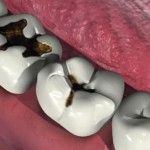 We’ve all been there. The dentist is touching each tooth with a silver pick and poking around for signs of cavities! You always brush your teeth every morning. Occasionally you floss. What more can you do to keep dental decay at bay? Well…the food you eat, the toothpaste you use—even the water you drink can play a large role in your dental health. Wondering how to fight the good fight against plaque and bacteria? Read on and fight tooth decay!
We’ve all been there. The dentist is touching each tooth with a silver pick and poking around for signs of cavities! You always brush your teeth every morning. Occasionally you floss. What more can you do to keep dental decay at bay? Well…the food you eat, the toothpaste you use—even the water you drink can play a large role in your dental health. Wondering how to fight the good fight against plaque and bacteria? Read on and fight tooth decay!
Keep a Clean Mouth
Ever notice a coating on your teeth…an unclean feeling after eating a meal? What you’re feeling with your tongue is plaque. Plaque forms when bacteria, acid, food debris and saliva combine. Over time, plaque can dissolve the enamel of your teeth, leaving them open and vulnerable to decay and paving the way for cavities to appear.
Brushing your teeth thoroughly just twice a day with a toothpaste containing fluoride can greatly reduce your chances of getting a cavity.
Sugar-Free is the Way to Be
Good nutrition, especially in children, aids in preventing tooth decay. Studies suggest that those who eat whole grains, vegetables, fruits, and foods low in saturated fat and sodium are less likely to form cavities.
Did you know that some foods, including mozzarella and other cheeses, yogurt, milk, peanuts and sugar-free chewing gum are actually good for your teeth? They can clear your mouth of bad sugars and shield your enamel from plaque.
If you’ve already brushed your teeth at night—don’t reach for that midnight snack! It’s the food left on your teeth overnight that is the most likely to cause cavities.
You’ll want to avoid foods that contain a lot of sugar. Steer clear of syrups, taffy and candy and desserts—which can increase plaque, and your chances for dental decay. Instead eat teeth-cleaning foods like carrots, celery, apples – fibrous foods. Your digestive system greatly benefits as well.
Don’t Hide From Fluoride
Found throughout the earth’s crust, fluoride is a natural mineral that can prevent cavities in two ways. These include hardening the enamel of baby teeth and helping strengthen new teeth as they emerge. Fluoride also helps harden the enamel of adult teeth that have already grown in.
Did you know that tap water contains fluoride? Tooth decay has decreased considerably since this addition. While you can still drink bottled water—don’t forget to have some tap water as well because bottled water has no fluoride.
Fluoride can also be found in toothpastes and mouth washes. If your dentist finds that your teeth still aren’t receiving enough fluoride, he may suggest a fluoride treatment. During this treatment your dentist will apply concentrated fluoride to your teeth for a few minutes.
Don’t Delay on Tooth Decay
Unfortunately, even when we try out best, cavities can still occur! If you do have a cavity that ends up needing a filling, make sure to take care of it early on. If you delay, you may end up with a badly decayed tooth and you may need a root canal.
A root canal is a treatment used to repair a tooth that is badly decayed. Endodontists specialize in this and can perform them virtually pain free. With today’s resources and technology, this procedure has become much easier for patients to bear and for endodontists to perform. So if a cavity comes, it doesn’t mean the tooth is lost.
